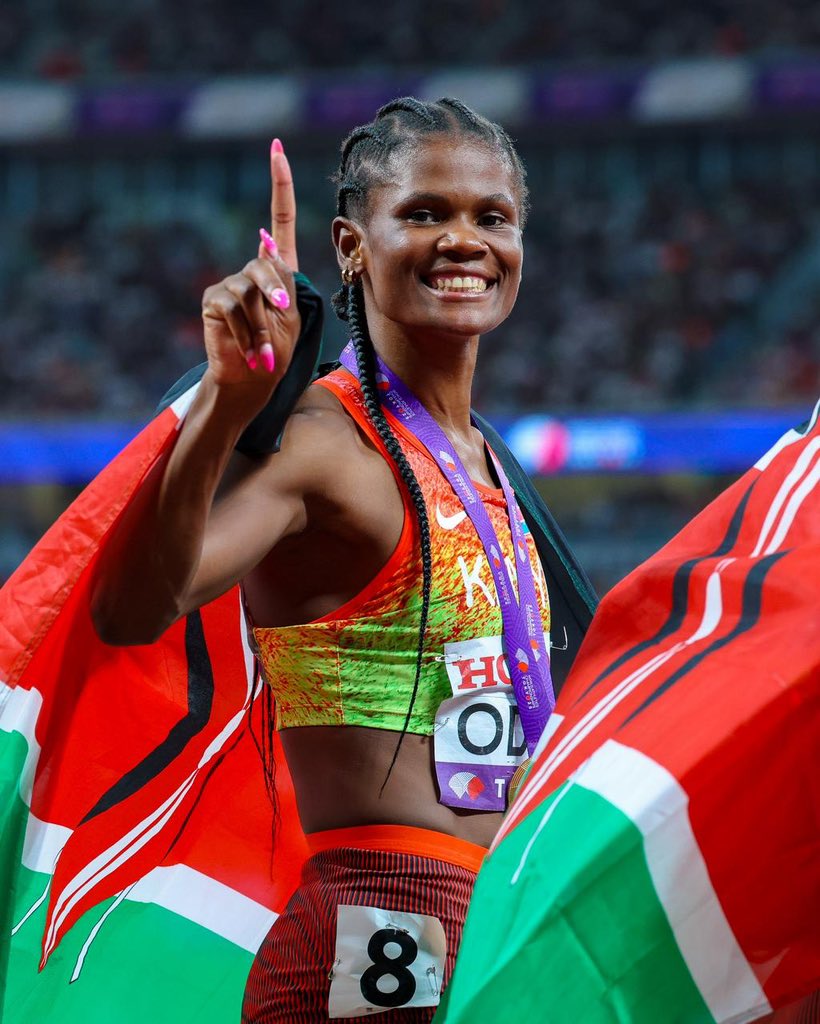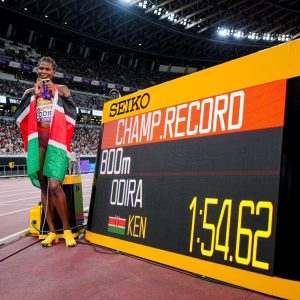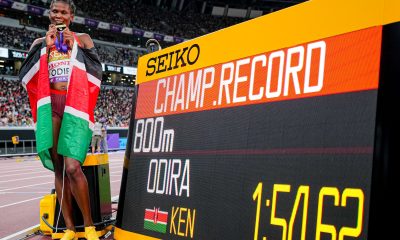Sports
Lilian Odira: From Migori To Stunning The World Athletics Arena
Her story is particularly inspiring for young women, demonstrating that motherhood need not derail athletic ambitions, and that geographical origins should not determine sporting destinies.

How a young mother from football-mad Migori County rewrote Kenya’s athletics narrative with one stunning race in Tokyo
In the electric atmosphere of Tokyo’s National Stadium on September 21, 2025, as eight of the world’s finest 800-meter runners crouched at the starting line, few would have predicted that the woman positioned at the back of the pack would soon be standing atop the podium with gold around her neck.
But Lilian Odira of Kenya did exactly that, running away with a championship record of 1:54.62 in what marked her world championships debut.
The victory was more than just a personal triumph for the 26-year-old from Migori County.
It was a seismic shift that challenged decades of athletic orthodoxy in Kenya, a country where success in middle-distance running has long been synonymous with athletes from the Rift Valley regions.
Breaking the Mold
Born on April 18, 1999, Lilian Odira hails from Migori County in the larger Nyanza region, an area famous for producing the country’s top footballers rather than world-beating runners.
Her emergence as a world champion represents a fundamental break from the geographical stereotypes that have long defined Kenyan athletics.
“Migori County is synonymous with football,” explains a local sports analyst.
The lakeside region has historically been Kenya’s football heartland, producing numerous national team players and nurturing a culture where young people gravitate toward the beautiful game rather than the track. Odira’s success challenges this narrative entirely.
Her journey to the top has been anything but conventional.
In 2024, she became Kenyan national champion over 800 metres, retaining her title in 2025.
But what makes her story particularly compelling is the path she took to get there—one that included taking time off for maternity leave before returning to compete at the highest level.
A Champion’s Journey
Odira’s athletic breakthrough came relatively recently. Running for the Kenyan Prisons Service, she returned to competitive athletics in 2024 after serving maternity leave, a testament to the balancing act many female athletes face between motherhood and sporting ambitions.
The 2024 season marked her emergence on the international stage.
At the African Games in Accra, Ghana, she finished fourth in the women’s 800m with a time of 2:00.81.
By May 2024, she had claimed her first national title in Nairobi with a time of 2:02.21, before winning the Kenyan Olympic qualifier in June ahead of Mary Moraa with a time of 1:59.27.
Her consistency throughout 2024 earned her selection for the Paris Olympics, where she reached the semifinals—a performance that hinted at greater things to come.
She also claimed silver at the African Championships in Douala, Cameroon, recording 2:00.36.
The Road to Tokyo Gold
The 2025 season saw Odira elevate her game to new heights.
At the 2025 Absa Kip Keino Classic in Nairobi, she won the women’s 800m in a personal best of 1:58.31, securing her spot at the Tokyo 2025 World Championships.
The home crowd celebration was a preview of what was to come on the global stage.
But perhaps the most telling preparation came at the Diamond League, where she set a personal best of 1:56.52, finishing runner-up to Great Britain’s Keely Hodgkinson—the same athlete she would stun months later in Tokyo.
The Race That Changed Everything
In Tokyo, Odira tactically waited at the back before taking down four rivals in the home straight, including Olympic champion Keely Hodgkinson, in what was described as one of the biggest surprises of the World Athletics Championships.
Her winning time of 1:54.62 was a personal best by nearly two seconds and became the 7th fastest 800m time ever run by a woman.
The victory was Kenya’s seventh gold medal at the championships, but arguably the most unexpected. Pre-race favorites Hodgkinson and compatriot Mary Moraa were left trailing as Odira perfectly timed her kick to perfection.
## Redefining Regional Athletics
Odira’s triumph extends beyond individual achievement. She has fundamentally altered perceptions about athletic potential across Kenya’s diverse regions. Her success joins a growing narrative of Kenyan athletes breaking traditional geographical barriers in world athletics.
The significance of her victory resonates particularly strongly in Migori County and the broader Nyanza region. For generations, young people in these areas have been channeled toward football, with athletics viewed as the preserve of their Rift Valley cousins. Odira’s world championship gold provides a powerful counter-narrative.
“She has changed the country’s perspective on sports, based on regional stereotypes,” notes a local sports journalist. “Coming from the lakeside parts of the country, a place synonymous with football, she joins the likes of world champions Faith Kipyegon and Beatrice Chebet as Kenya’s present icons in athletics.”
At 26, Odira represents a new generation of Kenyan athletes who are expanding the nation’s athletic footprint beyond traditional boundaries.
Her story is particularly inspiring for young women, demonstrating that motherhood need not derail athletic ambitions, and that geographical origins should not determine sporting destinies.
Her success has not gone unnoticed at the highest levels of government, with officials acknowledging the importance of supporting athletes regardless of their regional background.
The victory has sparked conversations about expanding athletics infrastructure and coaching in previously underserved regions.
As Odira returns home with her world championship gold, she carries with her more than just a medal. She represents possibility for countless young athletes in Migori County and beyond who may have never considered athletics as their path to glory.
Her achievement serves as a reminder that talent knows no geographical boundaries, and that the next world champion might emerge from the most unexpected places. In a country where athletics success has long been associated with specific regions, Lilian Odira has proven that champions can come from anywhere—even from the football-loving shores of Lake Victoria.
The girl from Migori who shocked the athletics world has not just won gold; she has opened doors for an entire generation to dream bigger and reach further than ever before. In doing so, she has ensured that her legacy will extend far beyond the 1:54.62 it took her to circle the track twice in Tokyo.
As Kenya celebrates its newest athletics hero, one thing is clear: the map of Kenyan athletics has been redrawn, and Migori County now has its place firmly marked upon it.
Kenya Insights allows guest blogging, if you want to be published on Kenya’s most authoritative and accurate blog, have an expose, news TIPS, story angles, human interest stories, drop us an email on [email protected] or via Telegram
-

 Grapevine2 weeks ago
Grapevine2 weeks agoRussian Man’s Secret Sex Recordings Ignite Fury as Questions Mount Over Consent and Easy Pick-Ups in Nairobi
-

 News7 days ago
News7 days agoTHE FIRM IN THE DOCK: How Kaplan and Stratton Became the Most Scrutinised Law Firm in Kenya
-

 Investigations1 week ago
Investigations1 week agoMulti-Million Dollar Fraud: Three Kenyans Face US Extradition in Massive Cybercrime Conspiracy
-

 Economy1 week ago
Economy1 week agoIran Demands Arrest, Prosecution Of Kenya’s Cup of Joe Director Director Over Sh2.6 Billion Tea Fraud
-

 Business1 week ago
Business1 week agoA Farm in Kenya’s Rift Valley Ignites a National Reckoning With Israeli Investment
-

 Africa1 week ago
Africa1 week agoFBI Investigates Congresswoman Ilhan Omar’s Husband’s Sh3.8 Billion Businesses in Kenya, Somalia and Dubai
-

 Grapevine3 days ago
Grapevine3 days agoA UN Director Based in Nairobi Was Deep in an Intimate Friendship With Epstein — He Even Sent Her a Sex Toy
-

 Politics2 weeks ago
Politics2 weeks agoSifuna, Babu Owino Are Uhuru’s Project, Orengo Is Opportunist, Inconsequential in Kenyan Politics, Miguna Says





















